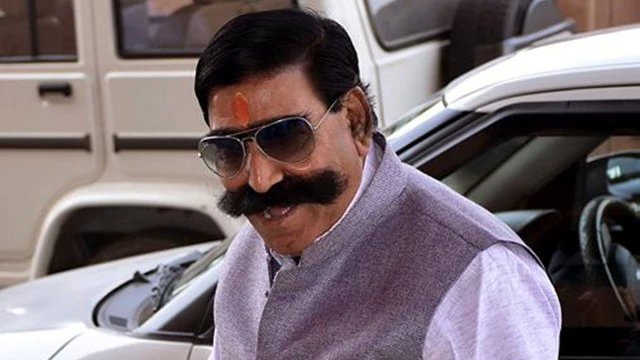On April 28, 2025, the Bharatiya Janata Party (BJP) expelled former Rajasthan MLA Gyandev Ahuja following a controversial incident where he “purified” a Ram temple in Alwar with Gangajal after a visit by Tika Ram Jully, a Dalit and the Leader of Opposition in the Rajasthan Assembly. The move, deemed an act of “indiscipline” by the BJP, has sparked widespread outrage and reignited debates about caste discrimination in Indian politics. This article delves into the incident, its political implications, and the broader context of caste dynamics in Rajasthan.

The Incident: Temple ‘Purification’ Sparks Outcry
The controversy began on April 7, 2025, when Ahuja, a former MLA from Ramgarh, performed a “purification” ritual at a Ram temple in Alwar’s Apna Ghar Shalimar residential society. The ritual followed a visit by Tika Ram Jully, a prominent Dalit Congress leader, who attended the temple’s consecration ceremony on Ram Navami. Ahuja claimed Jully was “anti-Hindutva” and “anti-Sanatan,” alleging his presence had rendered the temple “impure.” In a widely circulated video, Ahuja was seen sprinkling Gangajal (holy Ganga water) while chanting “Jai Siya Ram,” intensifying public backlash.
Jully condemned the act as a reflection of the BJP’s “mentality towards Dalits,” stating, “This is not just an attack on my faith but a statement promoting a crime like untouchability.” Congress leaders, including former Chief Minister Ashok Gehlot and party president Mallikarjun Kharge, echoed Jully’s sentiments, accusing the BJP of fostering caste-based discrimination. Gehlot called the act “narrow-minded” and unacceptable in a modern society, while Rahul Gandhi labeled it an insult to Dalit communities and constitutional values.
BJP’s Response: Suspension and Expulsion
The BJP moved swiftly to contain the fallout, particularly in eastern Rajasthan, where Dalit voters hold significant electoral influence. On April 8, 2025, the party suspended Ahuja and issued a show-cause notice, citing “gross indiscipline” and damage to the party’s image. BJP state general secretary Damodar Agarwal reminded Ahuja of the party’s anti-discrimination oath, noting that a Dalit, Kameshwar Chaupal, laid the first brick for the Ram Temple in Ayodhya in 1989.
Despite Ahuja’s defense that his actions targeted Congress ideology, not Jully’s Dalit identity, the BJP’s disciplinary committee conducted a probe. On April 27, 2025, Ahuja appeared before the committee, maintaining he had done nothing “anti-Dalit.” However, the committee found him guilty of breaching party values, leading to his expulsion on April 28, 2025. BJP state president Madan Rathore stated, “Ahuja’s continued association with the party would contradict its values and rules.”
Ahuja, unapologetic, claimed the BJP had succumbed to Congress propaganda and vowed to file defamation cases against senior Congress leaders, including Kharge.
Political Context: Dalit Voters and Rajasthan Politics
Dalits constitute approximately 17% of Rajasthan’s population, roughly 1.25 crore people, and hold sway in 34 reserved Assembly seats. In the 2023 state elections, the BJP won 22 of these seats, underscoring the community’s electoral importance. Ahuja’s actions risked alienating this crucial voter base, prompting the BJP’s damage-control measures.
The timing of the expulsion, just before Congress’s ‘Save the Constitution’ rally in Jaipur, suggests strategic intent to mitigate criticism from opposition leaders like Kharge and Jully. The Congress has seized the opportunity to frame the incident as evidence of the BJP’s “anti-Dalit” stance, with Rahul Gandhi accusing the party of promoting “Manuvadi thinking” over constitutional ideals.
Ahuja’s Controversial History
This is not the first time Gyandev Ahuja, a 74-year-old RSS veteran, has courted controversy. Known for his inflammatory rhetoric, Ahuja previously:
-
Claimed in 2016 that Jawaharlal Nehru University was a hub of “sex and drugs,” alleging thousands of condoms and liquor bottles were found on campus daily.
-
Defended cow vigilantism in 2017, stating those who smuggle or slaughter cows “will be killed.”
-
Was booked in 2021 for hate speech, reflecting his polarizing public persona.
Ahuja’s roots in the Rashtriya Swayamsevak Sangh (RSS) and his tenure as a three-time Ramgarh MLA (1998–2003, 2013–2018) have made him a prominent figure in Rajasthan’s political landscape. However, his repeated controversies have often embarrassed the BJP, culminating in his expulsion.
Why This Matters: Caste, Religion, and Indian Politics
The Alwar temple incident highlights the persistent challenge of caste discrimination in India, even in sacred spaces. Jully, a three-time MLA from Alwar Rural and Rajasthan’s first Dalit Leader of Opposition, has been a vocal advocate against untouchability. His participation in the temple ceremony was a symbolic act of inclusion, making Ahuja’s response particularly inflammatory.
The controversy also underscores the delicate balance political parties must strike in addressing caste dynamics. For the BJP, distancing itself from Ahuja’s actions was critical to maintaining its broader voter appeal. For Congress, the incident provides ammunition to critique the BJP’s social policies, especially ahead of key electoral cycles.
Looking Ahead: Implications for Rajasthan
As Rajasthan navigates this political storm, the incident raises broader questions about inclusivity in religious and political spheres. Will the BJP’s expulsion of Ahuja quell accusations of casteism, or will Congress’s narrative gain traction among Dalit voters? With upcoming rallies and elections on the horizon, both parties will likely intensify their outreach to marginalized communities.
For news readers, this story serves as a reminder of the intersection between caste, religion, and politics in shaping India’s democratic discourse. As Tika Ram Jully aptly asked, “Does the BJP hate Dalits so much that they cannot see us perform puja?” The answer may lie in how political leaders address such incidents moving forward.
Sources: The Indian Express, April 28, 2025; The Times of India, April 28, 2025; Hindustan Times, April 27, 2025
